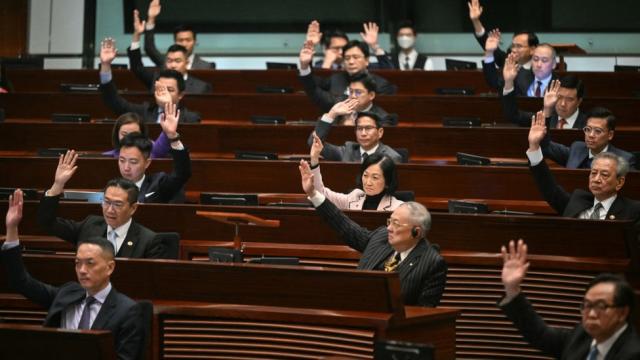|
|
Hong Kong’s new law is 'final nail in coffin', say critics
Money Land Forum / News / Hong Kong’s new law is 'final nail in coffin', say critics (2 Posts | 46 Views)
(1) (Go Down)
|
Hong Kong’s new law is 'final nail in coffin', say critics by ayodeji11(m) : 4:36 pm On Mar 20 |
 Western leaders, the United Nations, and human rights organizations have united in condemning Hong Kong's recent enactment of a new security law, arguing that it further erodes basic freedoms. Dubbed Article 23 locally, the law was unanimously approved by the city's pro-Beijing legislature, targeting a wide array of activities deemed treasonous. While officials assert the law is crucial for maintaining stability, critics decry it as a detrimental blow to the city's autonomy. China has persistently advocated for the law and dismissed criticism from opponents as unfounded "smears." Under the new law, closed-door trials are permitted, and police have been granted the authority to detain suspects for up to 16 days without charge, with potential penalties including life imprisonment, among other consequences. Frances Hui, an activist now residing in the United States, described the legislation as a "final nail in a closed coffin," asserting that it would further repress freedoms in Hong Kong with its extended severe sentences and broadened definition of national security. A coalition of 81 lawmakers and public figures from various countries, including the United Kingdom, United States, Canada, and South Korea, issued a joint statement expressing "grave concerns" over the legislation. They noted that it builds upon Beijing's 2020 National Security Law, criminalizing activities such as secession, subversion, terrorism, and collusion with foreign entities. The statement criticized the legislation for undermining due process and fair trial rights, thereby violating Hong Kong's obligations under international human rights law and endangering its reputation as an open international city. It described the law as another "devastating blow" to freedom. The United States expressed being "alarmed" by the law's "sweeping and vaguely-defined" provisions, a sentiment echoed by the European Union, which warned that the law could have repercussions on the city's status as a global business hub. Meanwhile, the UK's Foreign Secretary David Cameron said the law would "further damage rights and freedoms" and "entrench a culture of self-censorship" in the former British colony. Hongkongers have told the BBC how they are already being careful with what they say to friends and colleagues, fearing an "informant culture" has developed in the city. Lord Cameron's comments sparked a strong response from the Chinese Embassy in the UK, which rubbished his remarks as "a serious distortion of the facts". China's government also hit back at the criticisms of Article 23, saying it is "unswervingly determined to safeguard national sovereignty, security and development interests, implement the 'one country, two systems' policy, and oppose any external interference in Hong Kong affairs". "All attacks and smears will never succeed and are doomed to fail," foreign ministry spokesman Lin Jian told a regular press conference in Beijing. Hong Kong's leader John Lee had earlier also defended the law - which was fast-tracked through its final phase on Tuesday - saying the legislation would help the city "effectively prevent, suppress and punish espionage activities, conspiracies and traps from foreign intelligence agencies, and infiltration and sabotage by hostile forces". "From now on, the people of Hong Kong will no longer experience these harms and sorrows," he added. But those who led the pro-democracy protests against China's increasing influence on the city see the new law as yet another lost battle. It brings Hong Kong "one step closer to the system of mainland China", former Hong Kong lawmaker Nathan Law, who is now in exile in the UK, told the BBC's Newsday program. "The chilling effect... and the result of a collapse of civil society is impacting most Hong Kong people." Ms Hui said she is also concerned the law could also be used to target HongKongers overseas, or their families and friends back home. The city has previously offered bounties for information on activists who fled overseas, and arrested four people in Hong Kong for supporting people abroad who "endanger national security". Ms Hui left Hong Kong in 2020 after Beijing imposed the NSL which has since seen more than 260 people arrested. It was introduced in response to massive pro-democracy protests which engulfed the city in 2019. She said civil liberties in Hong Kong are "long gone" four years after the NSL took effect. Chris Patten, Hong Kong's last British governor, described the legislation as "another large nail in the coffin of human rights and the rule of law in Hong Kong and a further disgraceful breach of the Joint Declaration". Hong Kong was handed back by the UK to China in 1997 under the principle of "one country, two systems", which guaranteed the city a certain degree of autonomy. While Beijing and Hong Kong both insist this is still the case, critics and international rights groups say China's grip on the city has only tightened with time. |
|
Re: Hong Kong’s new law is 'final nail in coffin', say critics by Chairman(m) : 2:34 am On Mar 21 |
|
Noted
|
(1) (Reply)
Lauretta Onochie is not qualified to be an INEC commissioner -Femi Falana / UN Urges Togo To Respond To Protesters' 'Expectations' / Cash crunch: Labour draws battle lines, warns against salary slash /
(Go Up)
| Money Land Forum - Copyright © 2016 - 2024 | Aderonke Bamidele (Admin). All rights reserved. Follow Money Land Forum on Facebook and Twitter Disclaimer: Every Money Land Forum member is solely responsible for anything that he/she posts or uploads on Money Land Forum. |

